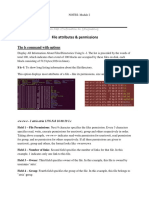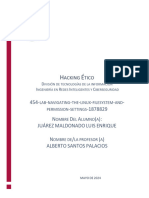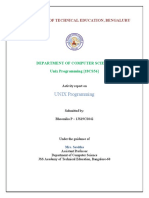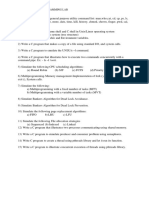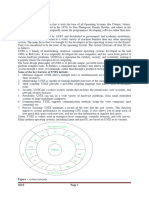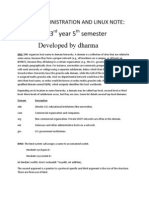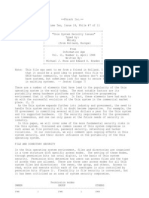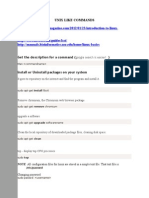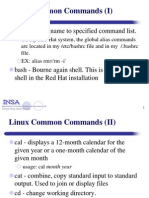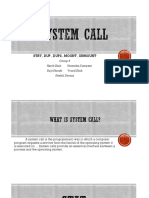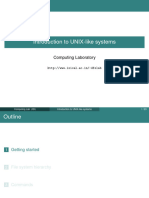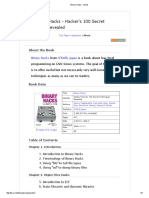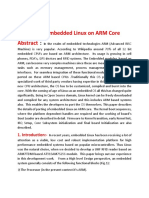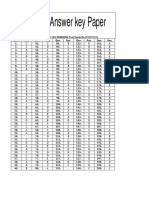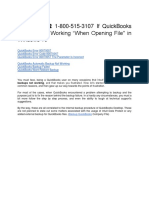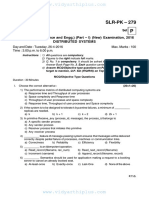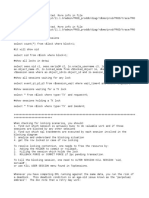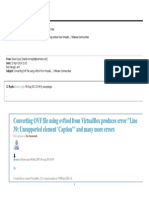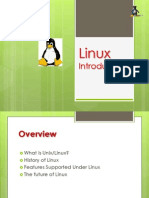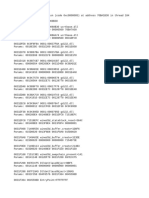CS631 - Advanced Programming in The UNIX Environment - Files and Directories
CS631 - Advanced Programming in The UNIX Environment - Files and Directories
Uploaded by
Akhilesh ChaudhryCopyright:
Available Formats
CS631 - Advanced Programming in The UNIX Environment - Files and Directories
CS631 - Advanced Programming in The UNIX Environment - Files and Directories
Uploaded by
Akhilesh ChaudhryOriginal Description:
Original Title
Copyright
Available Formats
Share this document
Did you find this document useful?
Is this content inappropriate?
Copyright:
Available Formats
CS631 - Advanced Programming in The UNIX Environment - Files and Directories
CS631 - Advanced Programming in The UNIX Environment - Files and Directories
Uploaded by
Akhilesh ChaudhryCopyright:
Available Formats
CS631 - Advanced Programming in the UNIX Environment
Slide 1
CS631 - Advanced Programming in the UNIX
Environment
Files and Directories
Department of Computer Science
Stevens Institute of Technology
Jan Schaumann
jschauma@stevens.edu
https://www.cs.stevens.edu/~jschauma/631/
Lecture 03: Files and Directories
September 19, 2016
CS631 - Advanced Programming in the UNIX Environment
Slide 2
Code Reading
HW#2
Lecture 03: Files and Directories
September 19, 2016
CS631 - Advanced Programming in the UNIX Environment
Slide 3
stat(2) family of functions
#include <sys/types.h>
#include <sys/stat.h>
int stat(const char *path, struct stat *sb);
int lstat(const char *path, struct stat *sb);
int fstat(int fd, struct stat *sb);
Returns: 0 if OK, -1 on error
All these functions return extended attributes about the referenced file (in
the case of symbolic links, lstat(2) returns attributes of the link, others
return stats of the referenced file).
Lecture 03: Files and Directories
September 19, 2016
CS631 - Advanced Programming in the UNIX Environment
Slide 4
stat(2) family of functions
#include <sys/types.h>
#include <sys/stat.h>
int stat(const char *path, struct stat *sb);
int lstat(const char *path, struct stat *sb);
int fstat(int fd, struct stat *sb);
Returns: 0 if OK, -1 on error
All these functions return extended attributes about the referenced file (in
the case of symbolic links, lstat(2) returns attributes of the link, others
return stats of the referenced file).
struct stat {
dev_t
ino_t
mode_t
dev_t
nlink_t
uid_t
gid_t
off_t
time_t
time_t
time_t
long
long
};
st_dev;
st_ino;
st_mode;
st_rdev;
st_nlink;
st_uid;
st_gid;
st_size;
st_atime;
st_mtime;
st_ctime;
st_blocks;
st_blksize;
Lecture 03: Files and Directories
/*
/*
/*
/*
/*
/*
/*
/*
/*
/*
/*
/*
/*
device number (filesystem) */
i-node number (serial number) */
file type & mode (permissions) */
device number for special files */
number of links */
user ID of owner */
group ID of owner */
size in bytes, for regular files */
time of last access */
time of last modification */
time of last file status change */
number of 512-byte* blocks allocated */
best I/O block size */
September 19, 2016
CS631 - Advanced Programming in the UNIX Environment
Slide 5
struct stat: st mode
The st mode field of the struct stat encodes the type of file:
regular most common, interpretation of data is up to application
directory contains names of other files and pointer to information
on those files. Any process can read, only kernel can write.
character special used for certain types of devices
block special used for disk devices (typically). All devices are
either character or block special.
FIFO used for interprocess communication (sometimes called
named pipe)
socket used for network communication and non-network
communication (same host).
symbolic link Points to another file.
Find out more in <sys/stat.h>.
Lecture 03: Files and Directories
September 19, 2016
CS631 - Advanced Programming in the UNIX Environment
Slide 6
struct stat: st mode
Lets improve simple-ls.c.
$ ssh linux-lab
$ cc -Wall simple-ls.c
$ ./a.out ~jschauma/apue/03/tmp
.
..
log
ev
[...]
$ cc -Wall simple-ls-stat.c
$ ./a.out ~jschauma/apue/03/tmp
. (directory - directory)
.. (directory - directory)
log (socket - socket)
dev (directory - symbolic link)
[...]
Lecture 03: Files and Directories
September 19, 2016
CS631 - Advanced Programming in the UNIX Environment
Slide 7
File types for standard file descriptors
You can glean how the OS implements e.g. pipes by inspecting certain
files in a procfs:
$ ls -l /dev/fd/1
$ ls -l /dev/fd/1 | cat
Lecture 03: Files and Directories
September 19, 2016
CS631 - Advanced Programming in the UNIX Environment
Slide 8
struct stat: st mode, st uid and st gid
Every process has six or more IDs associated with it:
real user ID
who we really are
real group ID
effective user ID
used for file access permission checks
effective group ID
supplementary group IDs
saved set-user-ID
saved by exec functions
saved set-group-ID
Whenever a file is setuid, set the effective user ID to st uid. Whenever a
file is setgid, set the effective group ID to st gid. st uid and st gid
always specify the owner and group owner of a file, regardless of
whether it is setuid/setgid.
Lecture 03: Files and Directories
September 19, 2016
CS631 - Advanced Programming in the UNIX Environment
Slide 9
setuid(2)/seteuid(2)
#include <unistd.h>
int seteuid(uid t uid);
int setuid(uid t euid);
Returns: 0 if OK, -1 on error
uid t geteuid(void);
uid t getuid(void);
Returns: uid t; no error
See also: getresuid(2) (if GNU SOURCE)
setuid programs should only use elevated privileges when needed. Note:
after using setuid(2), you cannot regain elevated privileges. This is by
design!
setuid.c
Lecture 03: Files and Directories
September 19, 2016
CS631 - Advanced Programming in the UNIX Environment
Slide 10
access(2)
#include <unistd.h>
int access(const char *path, int mode);
Returns: 0 if OK, -1 on error
Tests file accessibility on the basis of the real uid and gid. Allows
setuid/setgid programs to see if the real user could access the file
without it having to drop permissions to do so.
The mode paramenter can be a bitwise OR of:
R OK test for read permission
W OK test for write permission
X OK test for execute permission
F OK test for existence of file
Lecture 03: Files and Directories
September 19, 2016
CS631 - Advanced Programming in the UNIX Environment
Slide 11
access(2)
$ cc -Wall access.c
$ ./a.out /etc/passwd
access ok for /etc/passwd
open ok for /etc/passwd
$ ./a.out /etc/master.passwd
access error for /etc/master.passwd
open error for /etc/master.passwd
$ sudo chown root a.out
$ sudo chmod 4755 a.out
$ ./a.out /etc/passwd
access ok for /etc/passwd
open ok for /etc/passwd
$ ./a.out /etc/master.passwd
access error for /etc/master.passwd
open ok for /etc/master.passwd
$
Lecture 03: Files and Directories
September 19, 2016
CS631 - Advanced Programming in the UNIX Environment
Slide 12
struct stat: st mode
st mode also encodes the file access permissions (S IRUSR, S IWUSR,
S IXUSR, S IRGRP, S IWGRP, S IXGRP, S IROTH, S IWOTH, S IXOTH). Uses of
the permissions are summarized as follows:
To open a file, need execute permission on each directory
component of the path
Lecture 03: Files and Directories
September 19, 2016
CS631 - Advanced Programming in the UNIX Environment
Slide 13
struct stat: st mode
st mode also encodes the file access permissions (S IRUSR, S IWUSR,
S IXUSR, S IRGRP, S IWGRP, S IXGRP, S IROTH, S IWOTH, S IXOTH). Uses of
the permissions are summarized as follows:
To open a file, need execute permission on each directory
component of the path
To open a file with O RDONLY or O RDWR, need read permission
Lecture 03: Files and Directories
September 19, 2016
CS631 - Advanced Programming in the UNIX Environment
Slide 14
struct stat: st mode
st mode also encodes the file access permissions (S IRUSR, S IWUSR,
S IXUSR, S IRGRP, S IWGRP, S IXGRP, S IROTH, S IWOTH, S IXOTH). Uses of
the permissions are summarized as follows:
To open a file, need execute permission on each directory
component of the path
To open a file with O RDONLY or O RDWR, need read permission
To open a file with O WRONLY or O RDWR, need write permission
Lecture 03: Files and Directories
September 19, 2016
CS631 - Advanced Programming in the UNIX Environment
Slide 15
struct stat: st mode
st mode also encodes the file access permissions (S IRUSR, S IWUSR,
S IXUSR, S IRGRP, S IWGRP, S IXGRP, S IROTH, S IWOTH, S IXOTH). Uses of
the permissions are summarized as follows:
To open a file, need execute permission on each directory
component of the path
To open a file with O RDONLY or O RDWR, need read permission
To open a file with O WRONLY or O RDWR, need write permission
To use O TRUNC, must have write permission
Lecture 03: Files and Directories
September 19, 2016
CS631 - Advanced Programming in the UNIX Environment
Slide 16
struct stat: st mode
st mode also encodes the file access permissions (S IRUSR, S IWUSR,
S IXUSR, S IRGRP, S IWGRP, S IXGRP, S IROTH, S IWOTH, S IXOTH). Uses of
the permissions are summarized as follows:
To open a file, need execute permission on each directory
component of the path
To open a file with O RDONLY or O RDWR, need read permission
To open a file with O WRONLY or O RDWR, need write permission
To use O TRUNC, must have write permission
To create a new file, must have write+execute permission for the
directory
Lecture 03: Files and Directories
September 19, 2016
CS631 - Advanced Programming in the UNIX Environment
Slide 17
struct stat: st mode
st mode also encodes the file access permissions (S IRUSR, S IWUSR,
S IXUSR, S IRGRP, S IWGRP, S IXGRP, S IROTH, S IWOTH, S IXOTH). Uses of
the permissions are summarized as follows:
To open a file, need execute permission on each directory
component of the path
To open a file with O RDONLY or O RDWR, need read permission
To open a file with O WRONLY or O RDWR, need write permission
To use O TRUNC, must have write permission
To create a new file, must have write+execute permission for the
directory
To delete a file, need write+execute on directory, file doesnt matter
Lecture 03: Files and Directories
September 19, 2016
CS631 - Advanced Programming in the UNIX Environment
Slide 18
struct stat: st mode
st mode also encodes the file access permissions (S IRUSR, S IWUSR,
S IXUSR, S IRGRP, S IWGRP, S IXGRP, S IROTH, S IWOTH, S IXOTH). Uses of
the permissions are summarized as follows:
To open a file, need execute permission on each directory
component of the path
To open a file with O RDONLY or O RDWR, need read permission
To open a file with O WRONLY or O RDWR, need write permission
To use O TRUNC, must have write permission
To create a new file, must have write+execute permission for the
directory
To delete a file, need write+execute on directory, file doesnt matter
To execute a file (via exec family), need execute permission
Lecture 03: Files and Directories
September 19, 2016
CS631 - Advanced Programming in the UNIX Environment
Slide 19
struct stat: st mode
Which permission set to use is determined (in order listed):
1. If effective-uid == 0, grant access
Lecture 03: Files and Directories
September 19, 2016
CS631 - Advanced Programming in the UNIX Environment
Slide 20
struct stat: st mode
Which permission set to use is determined (in order listed):
1. If effective-uid == 0, grant access
2. If effective-uid == st uid
2.1. if appropriate user permission bit is set, grant access
2.2. else, deny access
Lecture 03: Files and Directories
September 19, 2016
CS631 - Advanced Programming in the UNIX Environment
Slide 21
struct stat: st mode
Which permission set to use is determined (in order listed):
1. If effective-uid == 0, grant access
2. If effective-uid == st uid
2.1. if appropriate user permission bit is set, grant access
2.2. else, deny access
3. If effective-gid == st gid
3.1. if appropriate group permission bit is set, grant access
3.2. else, deny access
Lecture 03: Files and Directories
September 19, 2016
CS631 - Advanced Programming in the UNIX Environment
Slide 22
struct stat: st mode
Which permission set to use is determined (in order listed):
1. If effective-uid == 0, grant access
2. If effective-uid == st uid
2.1. if appropriate user permission bit is set, grant access
2.2. else, deny access
3. If effective-gid == st gid
3.1. if appropriate group permission bit is set, grant access
3.2. else, deny access
4. If appropriate other permission bit is set, grant access, else deny
access
Lecture 03: Files and Directories
September 19, 2016
CS631 - Advanced Programming in the UNIX Environment
Slide 23
struct stat: st mode
Ownership of new files and directories:
st uid = effective-uid
st gid = ...either:
effective-gid of process
gid of directory in which it is being created
Lecture 03: Files and Directories
September 19, 2016
CS631 - Advanced Programming in the UNIX Environment
Slide 24
umask(2)
#include <sys/stat.h>
mode t umask(mode t numask);
Returns: previous file mode creation mask
umask(2) sets the file creation mode mask. Any bits that are on in the file
creation mask are turned off in the files mode.
Important because a user can set a default umask. If a program needs to
be able to insure certain permissions on a file, it may need to turn off (or
modify) the umask, which affects only the current process.
Lecture 03: Files and Directories
September 19, 2016
CS631 - Advanced Programming in the UNIX Environment
Slide 25
umask(2)
$ cc -Wall umask.c
$ umask 022
$ touch foo
$ ./a.out
$ ls -l foo*
-rw-r--r-- 1 jschauma
-rw-r--r-- 1 jschauma
-rw-rw-rw- 1 jschauma
-rw------- 1 jschauma
Lecture 03: Files and Directories
staff
staff
staff
staff
0
0
0
0
Sep
Sep
Sep
Sep
26
26
26
26
18:35
18:36
18:36
18:36
foo
foo1
foo2
foo3
September 19, 2016
CS631 - Advanced Programming in the UNIX Environment
Slide 26
chmod(2), lchmod(2) and fchmod(2)
#include <sys/stat.h>
int chmod(const char *path, mode t mode);
int lchmod(const char *path, mode t mode);
int fchmod(int fd, mode t mode);
Returns: 0 if OK, -1 on error
Changes the permission bits on the file. Must be either superuser or
effective uid == st uid. mode can be any of the bits from our discussion
of st mode as well as:
S ISUID setuid
S ISGID setgid
S ISVTX sticky bit (aka saved text)
S IRWXU user read, write and execute
S IRWXG group read, write and execute
S IRWXO other read, write and execute
Lecture 03: Files and Directories
September 19, 2016
CS631 - Advanced Programming in the UNIX Environment
Slide 27
chmod(2), lchmod(2) and fchmod(2)
$ rm foo*
$ umask 077
$ touch foo foo1
$ chmod a+rx foo
$ ls -l foo*
-rwxr-xr-x 1 jschaumann
-rw------- 1 jschaumann
$ cc -Wall chmod.c
$ ./a.out
$ ls -l foo foo1
-rwsr--r-x 1 jschaumann
-rw-r--r-- 1 jschaumann
$
Lecture 03: Files and Directories
staff
staff
0 Sep 15 23:00 foo
0 Sep 15 23:00 foo1
staff
staff
0 Sep 15 23:01 foo
0 Sep 15 23:01 foo1
September 19, 2016
CS631 - Advanced Programming in the UNIX Environment
Slide 28
chown(2), lchown(2) and fchown(2)
#include <unistd.h>
int chown(const char *path, uid t owner, gid t group);
int lchown(const char *path, uid t owner, gid t group);
int fchown(int fd, uid t owner, gid t group);
Returns: 0 if OK, -1 on error
Changes st uid and st gid for a file. For BSD, must be superuser.
Some SVR4s let users chown files they own. POSIX.1 allows either
depending on POSIX CHOWN RESTRICTED (a kernel constant).
owner or group can be -1 to indicate that it should remain the same.
Non-superusers can change the st gid field if both:
effective-user ID == st uid and
owner == files user ID and group == effective-group ID (or one of the
supplementary group IDs)
chown and friends (should) clear all setuid or setgid bits.
Lecture 03: Files and Directories
September 19, 2016
CS631 - Advanced Programming in the UNIX Environment
Slide 29
Directory sizes (on a system using UFS)
$ cd /tmp
$ mkdir -p /tmp/d
$ ls -ld /tmp/d
drwxr-xr-x 2 jschauma wheel 512 Sep 26 19:35 /tmp/d
$ touch d/a d/b d/c d/d d/e d/f d/g
$ ls -ld /tmp/d
drwxr-xr-x 2 jschauma wheel 512 Sep 26 19:35 /tmp/d
$ touch d/$(jot -b a 255 | tr -d [:space:])
$ ls -ld /tmp/d
drwxr-xr-x 2 jschauma wheel 512 Sep 26 19:35 /tmp/d
$ touch d/$(jot -b b 255 | tr -d [:space:])
$ ls -ld /tmp/d
drwxr-xr-x 2 jschauma wheel 1024 Sep 26 19:37 /tmp/d
$ rm /tmp/d/a*
$ ls -ld /tmp/d
drwxr-xr-x 2 jschauma wheel 1024 Sep 26 19:37 /tmp/d
$
Lecture 03: Files and Directories
September 19, 2016
CS631 - Advanced Programming in the UNIX Environment
Slide 30
Directory sizes (on a system using HFS+)
$ cd /tmp
$ mkdir -p /tmp/d
$ cd /tmp/d
$ ls -ld
drwxr-xr-x 2 jschauma
$ touch a
$ ls -ld
drwxr-xr-x 3 jschauma
$ echo $((102 / 3))
34
$ touch c
$ ls -ld
drwxr-xr-x 4 jschauma
$ rm c
$ ls -ld
drwxr-xr-x 3 jschauma
$
Lecture 03: Files and Directories
wheel
68 Sep 24 18:52 .
wheel
102 Sep 24 18:52 .
wheel
136 Sep 24 18:52 .
wheel
102 Sep 24 18:52 .
September 19, 2016
CS631 - Advanced Programming in the UNIX Environment
Slide 31
Homework
Reading:
manual pages for the functions covered
Stevens Chap. 4.1 through 4.13
Playing:
in your shell, set your umask to various values and see what happens
to new files you create (example: Stevens # 4.3)
Verify that turning off user-read permission for a file that you own
denies you access to the file, even if group- or other permissions
allow reading.
Midterm Assignment:
https://www.cs.stevens.edu/~jschauma/631/f16-midterm.html
Lecture 03: Files and Directories
September 19, 2016
You might also like
- ch8文件系统调用Document46 pagesch8文件系统调用yueli98354No ratings yet
- Unix Basics: Presented By: Benjamin LynchDocument42 pagesUnix Basics: Presented By: Benjamin LynchNakul MaheshwariNo ratings yet
- Notes - UP MODULE 2Document26 pagesNotes - UP MODULE 2kavitha GLNo ratings yet
- 19CS2106S 19CS2106A Test - I Set - 1 Key and SchemeDocument8 pages19CS2106S 19CS2106A Test - I Set - 1 Key and SchemeKilla AparnaNo ratings yet
- Tutorial 8 FileSystemDocument3 pagesTutorial 8 FileSystemSubhas ChandraNo ratings yet
- R20 OS Lab ManualDocument26 pagesR20 OS Lab ManualVenkat MarturiNo ratings yet
- Assignment 3 OsDocument10 pagesAssignment 3 OsdeekshachennamshettyNo ratings yet
- 4.5.4 Lab Navigating The Linux Filesystem and Permission Settings 1878829Document18 pages4.5.4 Lab Navigating The Linux Filesystem and Permission Settings 1878829Enrique JuárezNo ratings yet
- Use and Study of Linux Gui and Commands: Assignment No.1 AUGUST 3, 2015Document13 pagesUse and Study of Linux Gui and Commands: Assignment No.1 AUGUST 3, 2015chandan705136No ratings yet
- Unix&Network Programming: Study of Multiuser Operating System and Their Features"Document17 pagesUnix&Network Programming: Study of Multiuser Operating System and Their Features"imadprNo ratings yet
- Given - Chapter 3 File Systems and File HierarchyDocument15 pagesGiven - Chapter 3 File Systems and File HierarchyRoseNo ratings yet
- 3.2.2.4 Lab Navigating The Linux Filesystem and Permission SettingsDocument9 pages3.2.2.4 Lab Navigating The Linux Filesystem and Permission SettingsMICAH WALDRONNo ratings yet
- Bash Startup Files Linux/Unix Files Stty Todd KelleyDocument31 pagesBash Startup Files Linux/Unix Files Stty Todd Kelleydarwinvargas2011No ratings yet
- Unix Sample QuestionsDocument8 pagesUnix Sample QuestionsRomiSayagoNo ratings yet
- UP AssignmentDocument13 pagesUP AssignmentAmruth GowdaNo ratings yet
- OS LabDocument65 pagesOS Labkingbeats492No ratings yet
- Laporan Praktikum Lab18 - Basri WandiDocument9 pagesLaporan Praktikum Lab18 - Basri WandiBasri wandiNo ratings yet
- Unix Programming and Compiler DesignDocument68 pagesUnix Programming and Compiler DesignRaghu GowdaNo ratings yet
- Integer Value Name Symbolic Constant File Stream: Unistd.h Stdio.hDocument4 pagesInteger Value Name Symbolic Constant File Stream: Unistd.h Stdio.hliuylNo ratings yet
- PermissionsDocument15 pagesPermissionssheema shaikNo ratings yet
- LINUX Privilege EscalationDocument5 pagesLINUX Privilege Escalationtehila2038No ratings yet
- Unix 03Document60 pagesUnix 03Praveen KumarNo ratings yet
- Unit 3Document117 pagesUnit 3ABHILASH C NNo ratings yet
- Users and Groups - ArchWikiDocument12 pagesUsers and Groups - ArchWikiSeth RelianNo ratings yet
- 2 - Familiarisation of Linux CommandsDocument6 pages2 - Familiarisation of Linux CommandsDilna SebastianNo ratings yet
- Unit 1Document9 pagesUnit 1charancgrNo ratings yet
- Oop Unit VDocument18 pagesOop Unit VdevalepavanNo ratings yet
- Unit - 2Document26 pagesUnit - 2rathorehimanshi777No ratings yet
- Linux 5th Sem EvrDocument17 pagesLinux 5th Sem EvrTirthankar Roy ChowdhuryNo ratings yet
- Lab 4 Navigating - The - Linux - Filesystem - and - Permission - SettingsDocument9 pagesLab 4 Navigating - The - Linux - Filesystem - and - Permission - SettingsuzairNo ratings yet
- (S) Engineering Development Group (S) Pandemic V1.1: (U) Tool DocumentationDocument9 pages(S) Engineering Development Group (S) Pandemic V1.1: (U) Tool DocumentationNedjoNo ratings yet
- hw2 SolutionsDocument15 pageshw2 SolutionsNitesh KohliNo ratings yet
- Au Speakingunix14 PDFDocument9 pagesAu Speakingunix14 PDFMary ThompsonNo ratings yet
- pr2 Eng TTY 24 c5Document44 pagespr2 Eng TTY 24 c5sonyasovushka1212No ratings yet
- 3.1.2.7 Lab - Getting Familiar With The Linux ShellDocument13 pages3.1.2.7 Lab - Getting Familiar With The Linux ShellMUHAMMAD RIDHAN KHOIRULLAHNo ratings yet
- Linux Basis For InterviewDocument73 pagesLinux Basis For Interviewroheet123No ratings yet
- p18 0x07 Unix System Security Issues by Jester SluggoDocument9 pagesp18 0x07 Unix System Security Issues by Jester SluggoabuadzkasalafyNo ratings yet
- 06 Files DirsDocument26 pages06 Files DirsmandysorasoraNo ratings yet
- Unix Commands DocumentDocument21 pagesUnix Commands DocumentKaushik VelusamyNo ratings yet
- Commands/: Get The Description For A CommandDocument15 pagesCommands/: Get The Description For A CommandGegham MovsesNo ratings yet
- Linux Programming Unit 2Document9 pagesLinux Programming Unit 2jsanandkumar22No ratings yet
- Linux Common Commands (I) : Alias - Assign Name To Specified Command ListDocument23 pagesLinux Common Commands (I) : Alias - Assign Name To Specified Command ListShekhar RawatNo ratings yet
- Unix BasicsDocument179 pagesUnix BasicsAkash Kumar100% (1)
- Lecture 18.10.2017Document16 pagesLecture 18.10.2017tokega8670No ratings yet
- PPTSDocument27 pagesPPTSPratik PatilNo ratings yet
- PPTS Day-02Document19 pagesPPTS Day-02Pratik PatilNo ratings yet
- Solaris 10 - IDocument144 pagesSolaris 10 - IAndresNo ratings yet
- Lecture 14Document30 pagesLecture 14Tapos MondalNo ratings yet
- Linux ShellDocument14 pagesLinux ShellKonstantinos ChrisNo ratings yet
- Linuxfile AdminDocument232 pagesLinuxfile AdminTest1No ratings yet
- System CallDocument24 pagesSystem CallShefali DsouzaNo ratings yet
- Os Labmanual BcaivDocument21 pagesOs Labmanual BcaivRahul JoshiNo ratings yet
- Linux Quations and AnswersDocument82 pagesLinux Quations and AnswersSraVanKuMarThadakamallaNo ratings yet
- Os Lab #3Document21 pagesOs Lab #3Mark Odyssey Austria RodelNo ratings yet
- Unix-Like-SystemsDocument27 pagesUnix-Like-SystemsSoham ChakrabortyNo ratings yet
- UNIX - LINUX Interview Questions and AnswersDocument5 pagesUNIX - LINUX Interview Questions and AnswerssbalajisathyaNo ratings yet
- Unix AssigentmentDocument45 pagesUnix Assigentmentfakemailb4kNo ratings yet
- Best Free Open Source Data Recovery Apps for Mac OS English EditionFrom EverandBest Free Open Source Data Recovery Apps for Mac OS English EditionNo ratings yet
- Active/Passive: S.S.C. (T-I) 20 2017 IIIDocument48 pagesActive/Passive: S.S.C. (T-I) 20 2017 IIIAkhilesh ChaudhryNo ratings yet
- I2c Driver ArchitectureDocument12 pagesI2c Driver ArchitectureAkhilesh ChaudhryNo ratings yet
- Binary Hacks and DebugDocument5 pagesBinary Hacks and DebugAkhilesh ChaudhryNo ratings yet
- QuesDocument3 pagesQuesAkhilesh ChaudhryNo ratings yet
- DVB ProjectsDocument1 pageDVB ProjectsAkhilesh ChaudhryNo ratings yet
- Porting Embedded Linux On ARM Core: 1. IntroductionDocument13 pagesPorting Embedded Linux On ARM Core: 1. IntroductionAkhilesh ChaudhryNo ratings yet
- Curriculum Vitae ofDocument4 pagesCurriculum Vitae ofAkhilesh ChaudhryNo ratings yet
- Os1a SlidesDocument168 pagesOs1a SlidesAkhilesh ChaudhryNo ratings yet
- Tutorial API - GnublinDocument4 pagesTutorial API - GnublinAkhilesh ChaudhryNo ratings yet
- Etec 404Document11 pagesEtec 404Akhilesh ChaudhryNo ratings yet
- 16th August Morning Shift ANSWER KEY..Document1 page16th August Morning Shift ANSWER KEY..Akhilesh ChaudhryNo ratings yet
- Operating Systems ECE344: Lecture 3: ProcessesDocument46 pagesOperating Systems ECE344: Lecture 3: ProcessesAkhilesh ChaudhryNo ratings yet
- C Lab Worksheet 12 C & C++ Functions Part 1 (With No Return Values)Document7 pagesC Lab Worksheet 12 C & C++ Functions Part 1 (With No Return Values)Akhilesh ChaudhryNo ratings yet
- 2010 - CGL Tier 1 Paper 1Document9 pages2010 - CGL Tier 1 Paper 1Akhilesh ChaudhryNo ratings yet
- Computer Science IlluminatedDocument3 pagesComputer Science IlluminatedBRANTLEY TANNo ratings yet
- Logcat Prev CSC LogDocument170 pagesLogcat Prev CSC LogStefan AndreiNo ratings yet
- Chapter-8 (Controlling Services and Daemons)Document2 pagesChapter-8 (Controlling Services and Daemons)Kyar Nyo AyeNo ratings yet
- VMS Setup LogDocument66 pagesVMS Setup Logedwardapazan2No ratings yet
- Synchronizing Folders: Files Cannot Be Synchronized Between Computers Running XP and Those Running VistaDocument8 pagesSynchronizing Folders: Files Cannot Be Synchronized Between Computers Running XP and Those Running VistaomsdalNo ratings yet
- Cache Coherence - MESI MOESIDocument57 pagesCache Coherence - MESI MOESIMohd ImranNo ratings yet
- QuickBooks Automatic Backup Not WorkingDocument6 pagesQuickBooks Automatic Backup Not WorkingYash KumarNo ratings yet
- Distributed SystemsDocument4 pagesDistributed SystemsBarath krishnaNo ratings yet
- WinPE 11-10-8 Sergei Strelec (x86 - x64) 2023.01 English - KuyhaaDocument14 pagesWinPE 11-10-8 Sergei Strelec (x86 - x64) 2023.01 English - KuyhaaBrader HudNo ratings yet
- INSTALL FFFFDocument6 pagesINSTALL FFFFDatuna mikeladzeNo ratings yet
- x86 StderrDocument5 pagesx86 Stderravittt25No ratings yet
- Game Crash LogDocument6 pagesGame Crash LogKen AnuNo ratings yet
- Zend Server 5.6 Installation Guide 012212Document90 pagesZend Server 5.6 Installation Guide 012212Anonymous IjBD0iz3No ratings yet
- How To Fix A Broken Initrd Image in Linux-1Document7 pagesHow To Fix A Broken Initrd Image in Linux-1Ralph SoseraNo ratings yet
- How To Create Network Drive in Redhat LinuxDocument4 pagesHow To Create Network Drive in Redhat LinuxAdnaan AdnaanNo ratings yet
- Unit V Cloud Technologies and AdvancementsDocument33 pagesUnit V Cloud Technologies and AdvancementsspartansheikNo ratings yet
- D BlocksDocument2 pagesD BlocksMuhd QNo ratings yet
- ReadmeDocument3 pagesReadmeRafenNo ratings yet
- Performance Comparison of VxWorks Linux RTAI and Xenomai in A Hard Real-Time ApplicationDocument5 pagesPerformance Comparison of VxWorks Linux RTAI and Xenomai in A Hard Real-Time ApplicationsatyanaryanakNo ratings yet
- A1268916868 24915 27 2020 Lecture 2Document33 pagesA1268916868 24915 27 2020 Lecture 2BHANU CHANDRANo ratings yet
- 28 Things To Do After Fresh Installation of Fedora 26 WorkstationDocument33 pages28 Things To Do After Fresh Installation of Fedora 26 WorkstationAleksandar NikolicNo ratings yet
- Converting OVF File Using Ovftool From VirtualboxDocument14 pagesConverting OVF File Using Ovftool From VirtualboxChetan DasamNo ratings yet
- Embedded Systems Lab Manual MODDocument20 pagesEmbedded Systems Lab Manual MODHari0% (1)
- Linux PresentDocument47 pagesLinux PresentFaesal AmriNo ratings yet
- CA Lab SetupDocument4 pagesCA Lab SetupRehan QasimNo ratings yet
- Skip TPM Check On Dynamic Update - CMDDocument2 pagesSkip TPM Check On Dynamic Update - CMDCharles NjanjoNo ratings yet
- Citra LogDocument32 pagesCitra LogJunior PedroNo ratings yet
- Naziv Midlvera Windows 32bit Windows 64bit: NapomeneDocument1 pageNaziv Midlvera Windows 32bit Windows 64bit: NapomeneNemanja ProtićNo ratings yet
- CrashDocument2 pagesCrashYanzNo ratings yet
- Multithreading in Android: Ahsen TahirDocument19 pagesMultithreading in Android: Ahsen TahirHau DoNo ratings yet


